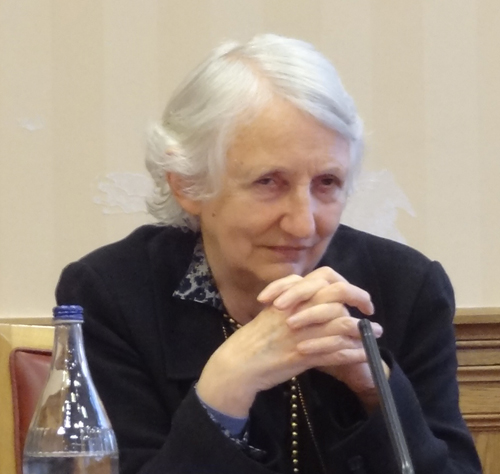
Your complimentary articles
You’ve read one of your four complimentary articles for this month.
You can read four articles free per month. To have complete access to the thousands of philosophy articles on this site, please
Philosophical Haiku
Onora O’Neill (1941-)
by Terence Green
Universal rule:
To be free, yet not too free
In science we trust(?)

Photo of O’Neill © N. Beale 2013
Onora O’Neill has the rare distinction among those who appear in this column of still being alive. She studied in Germany and became a Kantian philosopher. She has also served as President of the British Philosophical Association, chaired the UK’s Equality and Human Rights Commission, and has found time to become a Baroness.
She is particularly interested in trust and autonomy in medicine and bioethics. Our age is one of enormous advances in science and medicine: we are healthier, and live longer. Yet, at the same time, we seemingly don’t really trust those responsible for creating or administering these advances (given that Dr Frankenstein is the archetypal scientist-doctor, is that so surprising?). Here Baroness O’Neill diagnoses a case of too much autonomy held by the practitioners. How can you trust someone who has the power to remove your kidneys, when all you want is some powder for your athlete’s foot?
What is her prescription to cure this ill? Immanuel Kant, of course! As Kant argued, unlimited autonomy – unfettered, unbound, do-whatever-you-want autonomy – the sort of freedom to act that could be a threat to someone’s vital organs – is no recipe for ethical living. What is needed is principled autonomy – the kind that’s limited by the obligations we owe others: I won’t take your kidneys, you don’t take mine. In Kant’s formulation, principled autonomy – which he called ‘the categorical imperative’ – gives rise to actions whose justifying principle ought to be adopted by everyone in equivalent circumstances.
But, says the Baroness, that’s not enough. Autonomy also requires information. Much of our information comes to us from the media. But if that information constantly tells us to mistrust scientists and doctors and biotech companies, and the regulators who control them, then we will mistrust them, even if, in truth, there’s every reason to trust them. That is, media misinformation leads to misplaced mistrust. And so the media must also recognise its own obligation not to deceive and mislead in a shallow pursuit of profits. It should, in other words, also act on the basis of principled, not unlimited, autonomy.
It really is a lot to think about, and anything involving Kant always gives me quite a headache. I need an aspirin.
© Terence Green 2017
Terence is a peripatetic (though not Peripatetic) writer, historian and lecturer. He holds a PhD in the history of political thought from Columbia University, NYC, and lives with his wife and their dog in Wellington, NZ. He blogs at hardlysurprised.blogspot.co.nz.









